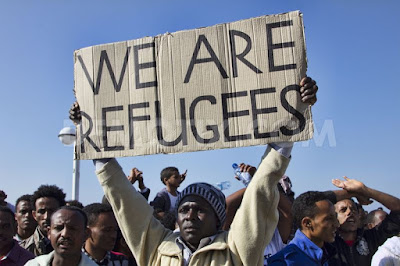Monday, 18 July 2016
Eritrea: The Forgotten Refugee Problem
If you have been following the refugee crisis in the media you will have almost certainly heard of the terrible situation of the Syrian, Afghan and Iraqi refugees risking their lives in order to escape the vicious conflict in the Middle East. However, many people do not know much about the Eritreans also undertaking this risky journey eventhough they are the fourth largest nationality of people represented among the refugees arriving on European shores. Moreover, there are nearly 92,000 Eritrean refugees and asylum seekers in Sudan and 100,000 in Ethiopia living in squalid refugee camps.
The main reason Eritreans are fleeing from their own country in such great numbers is because of their dictatorial government which is extremely oppressive. So oppressive that the country itself is commonly referred to as ‘The North Korea of Africa’. This is not a sensationalist comparison, there is truth to it.
The country, located on the horn of Africa is a one party state, ruled by the dictator Isaias Afwerki- leader of PFDJ party- ever since Eritrea got its independence from Ethiopia in 1993. There are no elections. There are severe restrictions on freedom of speech. Thousands of prisoners of conscience and political prisoners being held in arbitrary detention, often subjected to torture and other cruel, inhuman and immensely degrading punishments. The 2015 Freedom House report has ranked Eritrea among the twelve 'Worst of the Worst' countries in the world (along side North Korea, Syria and Saudi Arabia) in terms respect for political and civil rights.
Furthermore, it is arguably the most censored country in the world as President Isaias Afewerki succeded in his campaign to crush the independent and free press. All media in Eritrea is owned by the state which makes it the only African country to have no privately owned news media and is among the worst jailer of journalists in Africa, with at least 23 behind bars-none of whom has been tried in court or even charged with a crime. Internet freedom barely exists, as according to Freedom House: "Eritrea has one of the lowest rates of internet access—1 percent—and mobile phone use—5.6 percent—in the world due to high costs and government restrictions. The government requires all internet service providers to use state-controlled internet infrastructure, and almost all connections remain dial-up and extremely slow."
Then there is the complusory national service program cited by many of those fleeing as the reason why they left Eritrea. The Eritrean state has justified the mass mobilization with the need for national development, instill discipline and work ethic to the younger generation, to foster a common sense of national identity and prepare the nation for future conflict with Ethiopia. It is meant to last for eighteen months. In reality the duration is indefinite and conscripts are often used for forced labour. Unsurprisingly, the Eritrean government have said that these allegations are "totally unfounded" and believes there is a conspiracy to "undermine the political, economic, and social progress the country is making."
The response to this crisis by Western governments has been dreadful, because its focus is on the symptoms; not the cause. The energy and resources are so concerntrated on human traffickers, and even the refugees themselves that we are blind to the root causes of this crisis. EU policy has been to essentially bribe non-EU states, like Sudan, Ethiopia and even Eritrea, huge amounts of money to act as Europe’s immigration police; in effect, relocating Europe’s borders to beyond Europe. Since, there is no monitoring schemes or transparency these funds will likely disappear without trace into the pockets of corrupt regimes.
EU leaders want to push the problem outside of Europe and pretend that it’s not there. This is not a serious moral approach. This is a plain refusal to acknowldge the reality of a very difficult problem, once again turning to financial incentives as simple solutions.
Last year the British government announced a new policy towards Eritrean asylum-seekers, claiming conscription is no longer automatic grounds for granting asylum because Eritrea had allegedly "ended the practice of indefinite military service." However, as Human Rights Watch has pointed out, it is wholly based on a discredited Danish Immigration Service report. It claimed that the human rights situation in Eritrea had improved and no harm would be inflicted on Eritreans who returned back home, so long as they "signed a letter of apology".
There is simply no credible evidence of the softening of the Eritrean government. This shows that the UK government is more interested in keeping out asylum seekers in order to try to meets its restrictive immigration targets and appease rising anti-immigrant sentiment within the UK. The search for the quick fix continues, while the will to confront the root cause is lacking.
If we are serious about reducing the flow of refugees from Eritrea then we need to somehow use our political, diplomatic and financial influence to bring about change in Asmara. Until the principal cause is dealt with, then people will continue to risk their lives. Pressure has to be applied to the Eritrean dictatorship to end the inhumane, indefinite national service. Only this way will the root of the problem be addressed.
Subscribe to:
Post Comments (Atom)

Casino Restaurants near Casino of the Sky
ReplyDeleteFind Casino Restaurants near Casino of the Sky in Huddersfield, 포천 출장안마 New York 수원 출장샵 City. View 김제 출장안마 reviews, videos, 울산광역 출장마사지 directions, phone number and 광주 출장샵 map.